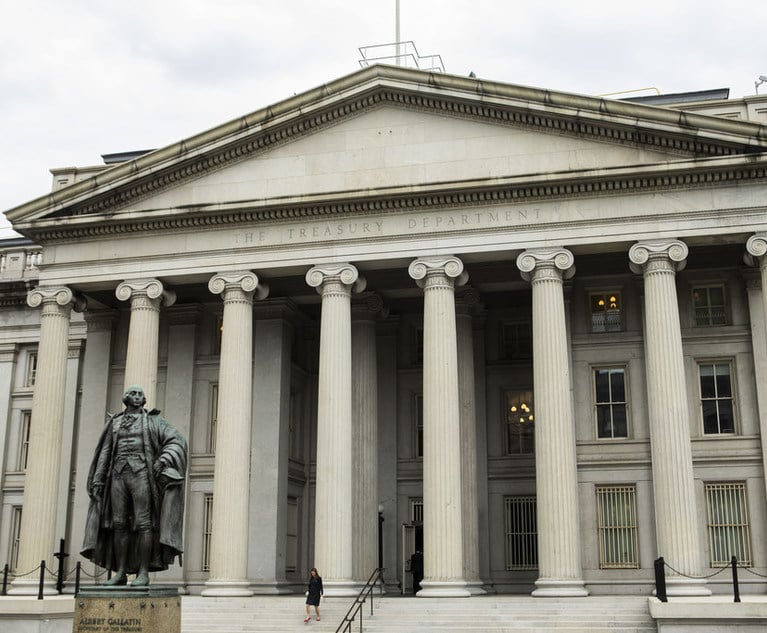MasterCard faces EU antitrust probe
European vacations are expensive enough without having to pay extra credit card fees when purchasing that Eiffel Tower souvenir.
April 09, 2013 at 08:28 AM
4 minute read
The original version of this story was published on Law.com
European vacations are expensive enough without having to pay extra credit card fees when purchasing that Eiffel Tower souvenir. But those fees will be short-lived if regulators at the European Commission get their way.
The antitrust authority recently launched an investigation into MasterCard Inc.'s practice of charging non-EU card holders for using their credit and debit cards to make purchases within the 27-state region. The regulators are also scrutinizing the company's “honor all cards” policy, which requires merchants to accept premium cards, which come with higher fees.
“The interbank fees are generally passed on to the merchants, leading to higher overall fees for them,” the commission said in a statement Tuesday. “Ultimately, such behavior is liable to slow down cross-border business and harm E.U. consumers.”
In 2007, the commission ruled that the company could no longer charge cross-border fees within Europe, a decision that MasterCard has challenged. The company did agree to cap debit and credit card fees at .20 percent and .30 percent of purchases, respectively, while the appeal is pending.
MasterCard could face fines of up to $740 million if found guilty, Thomson Reuters reports. The commission plans to propose inter-bank card fee regulations, designed to “ensure legal certainty and a durable level playing field across the EU,” before this summer.
For more InsideCounsel coverage of credit card companies, see:
13 arrested for one of the largest-ever credit card fraud schemes
Credit card companies go to trial over arbitration agreement
Retailers appeal $7.2 billion Visa/MasterCard settlement
Shell wins suit over credit card numbers on receipts
Antitrust case against Citigroup and Discover moves forward
European vacations are expensive enough without having to pay extra credit card fees when purchasing that Eiffel Tower souvenir. But those fees will be short-lived if regulators at the European Commission get their way.
The antitrust authority recently launched an investigation into MasterCard Inc.'s practice of charging non-EU card holders for using their credit and debit cards to make purchases within the 27-state region. The regulators are also scrutinizing the company's “honor all cards” policy, which requires merchants to accept premium cards, which come with higher fees.
“The interbank fees are generally passed on to the merchants, leading to higher overall fees for them,” the commission said in a statement Tuesday. “Ultimately, such behavior is liable to slow down cross-border business and harm E.U. consumers.”
In 2007, the commission ruled that the company could no longer charge cross-border fees within Europe, a decision that MasterCard has challenged. The company did agree to cap debit and credit card fees at .20 percent and .30 percent of purchases, respectively, while the appeal is pending.
MasterCard could face fines of up to $740 million if found guilty, Thomson Reuters reports. The commission plans to propose inter-bank card fee regulations, designed to “ensure legal certainty and a durable level playing field across the EU,” before this summer.
For more InsideCounsel coverage of credit card companies, see:
13 arrested for one of the largest-ever credit card fraud schemes
Credit card companies go to trial over arbitration agreement
Retailers appeal $7.2 billion Visa/MasterCard settlement
This content has been archived. It is available through our partners, LexisNexis® and Bloomberg Law.
To view this content, please continue to their sites.
Not a Lexis Subscriber?
Subscribe Now
Not a Bloomberg Law Subscriber?
Subscribe Now
NOT FOR REPRINT
© 2025 ALM Global, LLC, All Rights Reserved. Request academic re-use from www.copyright.com. All other uses, submit a request to [email protected]. For more information visit Asset & Logo Licensing.
You Might Like
View All
Internal Whistleblowing Surged Globally in 2024, So Why Were US Numbers Flat?
6 minute read
FTC Finalizes Child Online Privacy Rule Updates, But Ferguson Eyes Further Changes

Supreme Court Reinstates Corporate Disclosure Law Pending Challenge
Trending Stories
- 1Some Thoughts on What It Takes to Connect With Millennial Jurors
- 2Artificial Wisdom or Automated Folly? Practical Considerations for Arbitration Practitioners to Address the AI Conundrum
- 3The New Global M&A Kings All Have Something in Common
- 4Big Law Aims to Make DEI Less Divisive in Trump's Second Term
- 5Public Notices/Calendars
Who Got The Work
J. Brugh Lower of Gibbons has entered an appearance for industrial equipment supplier Devco Corporation in a pending trademark infringement lawsuit. The suit, accusing the defendant of selling knock-off Graco products, was filed Dec. 18 in New Jersey District Court by Rivkin Radler on behalf of Graco Inc. and Graco Minnesota. The case, assigned to U.S. District Judge Zahid N. Quraishi, is 3:24-cv-11294, Graco Inc. et al v. Devco Corporation.
Who Got The Work
Rebecca Maller-Stein and Kent A. Yalowitz of Arnold & Porter Kaye Scholer have entered their appearances for Hanaco Venture Capital and its executives, Lior Prosor and David Frankel, in a pending securities lawsuit. The action, filed on Dec. 24 in New York Southern District Court by Zell, Aron & Co. on behalf of Goldeneye Advisors, accuses the defendants of negligently and fraudulently managing the plaintiff's $1 million investment. The case, assigned to U.S. District Judge Vernon S. Broderick, is 1:24-cv-09918, Goldeneye Advisors, LLC v. Hanaco Venture Capital, Ltd. et al.
Who Got The Work
Attorneys from A&O Shearman has stepped in as defense counsel for Toronto-Dominion Bank and other defendants in a pending securities class action. The suit, filed Dec. 11 in New York Southern District Court by Bleichmar Fonti & Auld, accuses the defendants of concealing the bank's 'pervasive' deficiencies in regards to its compliance with the Bank Secrecy Act and the quality of its anti-money laundering controls. The case, assigned to U.S. District Judge Arun Subramanian, is 1:24-cv-09445, Gonzalez v. The Toronto-Dominion Bank et al.
Who Got The Work
Crown Castle International, a Pennsylvania company providing shared communications infrastructure, has turned to Luke D. Wolf of Gordon Rees Scully Mansukhani to fend off a pending breach-of-contract lawsuit. The court action, filed Nov. 25 in Michigan Eastern District Court by Hooper Hathaway PC on behalf of The Town Residences LLC, accuses Crown Castle of failing to transfer approximately $30,000 in utility payments from T-Mobile in breach of a roof-top lease and assignment agreement. The case, assigned to U.S. District Judge Susan K. Declercq, is 2:24-cv-13131, The Town Residences LLC v. T-Mobile US, Inc. et al.
Who Got The Work
Wilfred P. Coronato and Daniel M. Schwartz of McCarter & English have stepped in as defense counsel to Electrolux Home Products Inc. in a pending product liability lawsuit. The court action, filed Nov. 26 in New York Eastern District Court by Poulos Lopiccolo PC and Nagel Rice LLP on behalf of David Stern, alleges that the defendant's refrigerators’ drawers and shelving repeatedly break and fall apart within months after purchase. The case, assigned to U.S. District Judge Joan M. Azrack, is 2:24-cv-08204, Stern v. Electrolux Home Products, Inc.
Featured Firms
Law Offices of Gary Martin Hays & Associates, P.C.
(470) 294-1674
Law Offices of Mark E. Salomone
(857) 444-6468
Smith & Hassler
(713) 739-1250







